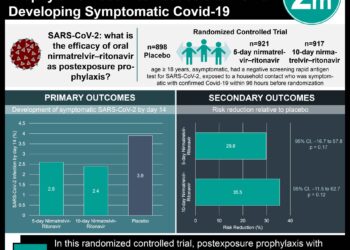BNT162b2 mRNA vaccine shows benefit against symptomatic and asymptomatic SARS-CoV-2 infection
1. Vaccinated individuals reported fewer SARS-CoV-2 infections and a lesser proportion of cases were symptomatic compared to the unvaccinated cohort.
2. BNT162b2 mRNA vaccine showed an effectiveness of 70% 21 days after a single dose.
Evidence Rating Level: 2 (Good)
Study Rundown: The BNT162b2 mRNA (Pfizer-BioNTech) and ChAdOx1 nCoV-19 adenoviral (Oxford-AstraZeneca) COVID-19 vaccines have been rapidly rolled out in the UK since December 2020. However, population-level vaccine effectiveness studies are needed to assess the impact of coronavirus vaccination and inform developments of public health policy. This prospective cohort study (SIREN) aimed to describe factors associated with both BNT162b2 and ChAdOx1 nCoV-19 vaccine coverage and early effectiveness of the BNT162b2 vaccine against symptomatic and asymptomatic infection in a large-scale cohort of healthcare workers in UK. The primary outcome for vaccine coverage analysis was the binary ever vaccinated variable (defined as having ³ 1 vaccine dose recorded between Dec 8, 2020, and Feb 5, 2021), while that for vaccine effectiveness analysis was PCR-confirmed SARS-CoV-2 infection (defined as a new PCR positive result for the negative cohort and reinfection in the positive cohort at the time of follow-up). According to study results, the BNT162b2 vaccine was effective against both symptomatic and asymptomatic SARS-CoV-2 infection in working-age adults. A limitation of this study may be the lack of objective functional assessments, such as baseline respiratory function, as the major outcomes considered were recorded through online questionnaires. Nonetheless, it provides valuable insight into the effectiveness of the BNT162b2 vaccine in a population-level cohort.
Click to read the study in The Lancet
Relevant Reading: Safety and Efficacy of the BNT162b2 mRNA Covid-19 Vaccine
In-depth [prospective cohort]: By Dec 7, 2020, 29 378 patients were assessed for eligibility across 104 hospital sites in the UK. Included patients were healthcare workers, support staff, and administrative staff (aged ≥18 years) who provided written consent and were able to complete the 12-month follow-up. Those with no PCR tests or insufficient PCR and antibody data were excluded. Altogether, 23 324 patients (8203 [35%] in the positive cohort and 15 121 [65%] in the negative cohort) met the inclusion criteria. The median patient age was 46.1 years (interquartile range [IQR] 36.0-54.1) and majority (84%) were female.
The total follow-up time was from Dec 7, 2020, to Feb 5, 2021, equivalent to 1 106 905 person-days (396 318 person-days vaccinated and 710 587 person-days unvaccinated). By Feb 5, 2021, 89% of patients (n=20 641) received at least one dose, with 94% receiving the BNT162b2 vaccine. Having a previous infection (adjusted odds ratio [aOR] 0.59, 95% confidence interval [CI] 0.54-0.64), being female (aOR 0.72, 95% CI 0.63-0.82), and age < 35 (aOR 0.78, 95% CI 0.64-0.96) were associated with significantly lower vaccine coverage. Compared to the vaccinated group, the unvaccinated group reported a substantially greater number of new infections (71 cases vs. 977 cases) during follow-up (adjusted hazard ratio 0.30, 95% CI 0.15-0.45). In the unvaccinated cohort, 543 (56%) patients had typical COVID-19 symptoms and 140 (14%) were asymptomatic 14 days prior to PCR-positive result, compared with 29 (36%) and 15 (19%) in the vaccinated cohort. A single dose of the BNT162b2 vaccine showed 70% (95% CI 55-85) effectiveness after three weeks. Findings from this study suggest that a single dose provides substantial efficacy against both symptomatic and asymptomatic COVID-19 infections.
Image: PD
©2021 2 Minute Medicine, Inc. All rights reserved. No works may be reproduced without expressed written consent from 2 Minute Medicine, Inc. Inquire about licensing here. No article should be construed as medical advice and is not intended as such by the authors or by 2 Minute Medicine, Inc.







